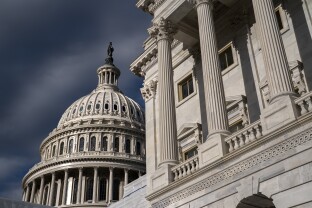The time during which a reconciliation bill is with the Senate parliamentarian would be a prime opportunity for lobbyists to get provisions tweaked or washed out.
Except the industry built on access has little influence with her: Elizabeth MacDonough is one of the rare players on Capitol Hill that refuses to meet with lobbyists.
“Cursing them. Yes. Lobbying them. No,” one Republican lobbyist texted NOTUS of the parliamentarian.
MacDonough is “effectively one of the most powerful women in the free world,” a Democratic lobbyist told NOTUS. Senate committees have been working for weeks with the parliamentarian on several facets of the Republican mega-bill, and they’ve already had to rework parts of the bill that the parliamentarian rejected.
While lobbyists can’t directly lobby the parliamentarian, several said they are trying to backchannel their demands through the process. Their targets include Medicaid, the Supplemental Nutrition Assistance Program, a tax on profits from third-party litigation funding and a 10-year moratorium on new state artificial intelligence regulations.
“A large part of the role we play is helping educate the staff and give them the ammunition to make the best arguments to their boss, for the parliamentarian,” Rich Gold, a Holland & Knight partner and leader of the firm’s public policy and regulation group, told NOTUS.
If a client is concerned about a provision in the bill, lobbyists could draft a Byrd memo to bring to senate staffers or provide them with “whatever supplementary information I think would be helpful in making the argument to knock a provision out of the bill,” the Democratic lobbyist said.
“A lobbyist like myself, we insert ourselves into the process by supplying evidence and arguments and detail to the minority, if they wish to use it, for including in their memo and their arguments to the parl,” they added.
Former senate staffers are familiar with this dynamic. But those who have worked with MacDonough and her office know it’s not as porous as lobbyists — and some lawmakers — would like.
“If you’re asking me, ‘Can you bamboozle Elizabeth?’ The answer is no,” said Jim Manley, who spent more than two decades working in the Senate, including a stint with the late Democratic leader, Harry Reid.
“There’s no lobbyists sitting there manipulating the process,” Manley added, although he noted lobbyists “serve increasingly as a research arm for staffers on Capitol Hill.”
MacDonough has served in the role since 2012, and her recommendation carries a lot of weight — although Senate Majority Leader John Thune has already overruled her once this year.
“We don’t meet with lobbyists — it’s an office policy and always has been,” MacDonough said in an email to NOTUS.
“They’re not really a lobbyable entity,” Gold said. “They really look at themselves as the referee on reconciliation, and there is established precedent, much like there is in court, for what does and doesn’t fit within reconciliation.”
Several lobbyists likened the process to a court case, where lawmakers and their staff fight to keep, remove or modify parts of the bill based on Senate rules. And the strength of those arguments sometimes matters, a veteran of the 2022 Inflation Reduction Act budget reconciliation process pointed out.
“You have the rules, but some of it is very subjective,” a former Senate Democratic aide told NOTUS. “I mean, whether you think that the policy implication is sort of incidental to the budgetary impact, that’s obviously not a hard and fast line.”
Some firms also have the firepower to work both sides of the aisle.
“We will simultaneously work with the majority to try to dull the edges of a provision that does some harm to our clients,” the Democratic lobbyist said, “and then with Democrats, we’ll work to try to knock it out.”
—
Taylor Giorno is a reporter at NOTUS.
Sign in
Log into your free account with your email. Don’t have one?
Check your email for a one-time code.
We sent a 4-digit code to . Enter the pin to confirm your account.
New code will be available in 1:00
Let’s try this again.
We encountered an error with the passcode sent to . Please reenter your email.


